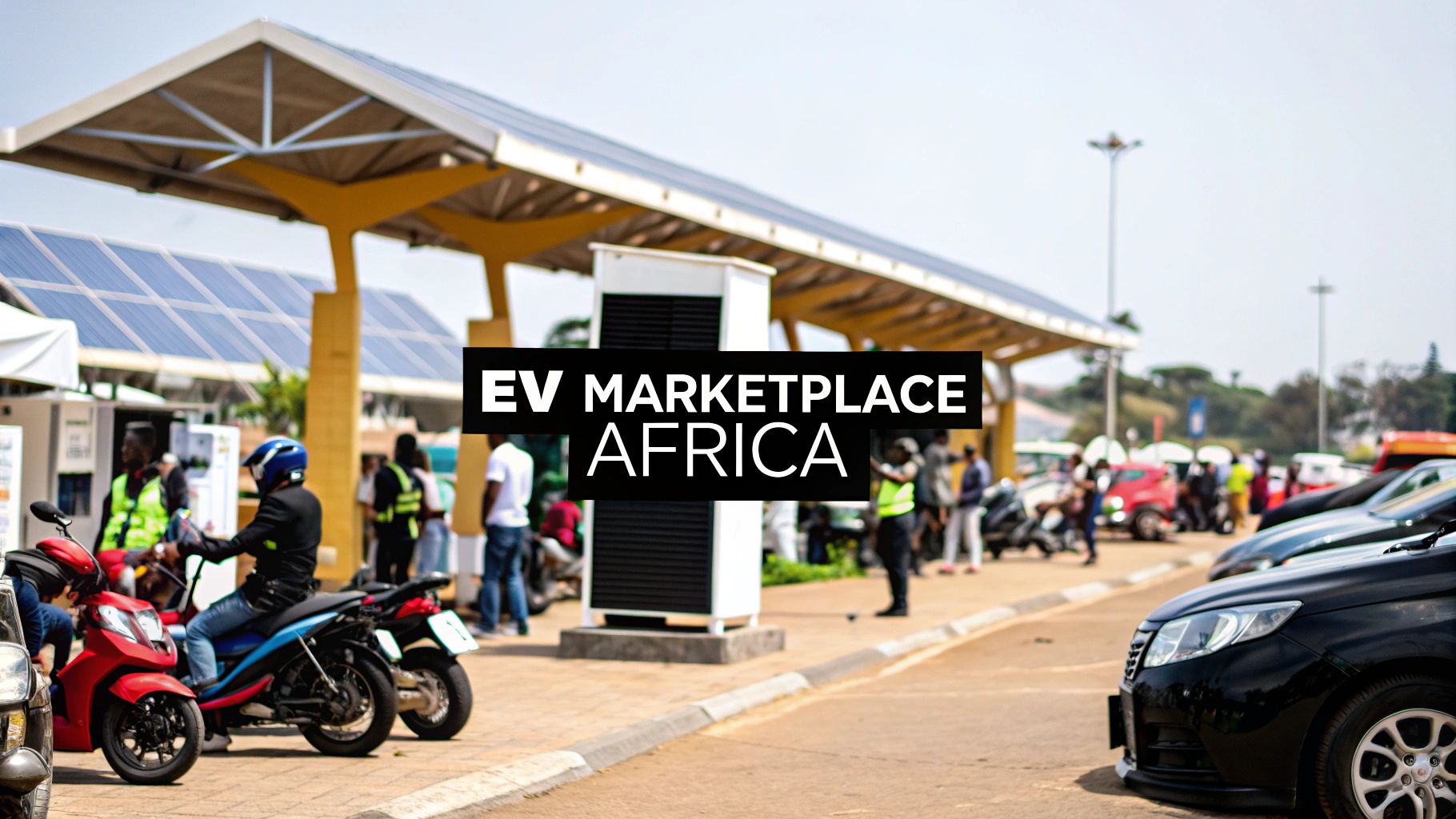
Picture a busy African city. But instead of the usual roar and smog from petrol engines, you hear the gentle hum of electric vehicles. This isn't some far-off fantasy—it's already starting to happen across the continent. The rise of the EV marketplace in Africa marks a huge shift, one that promises a cleaner and more stable economic future, all driven by local ingenuity.
Why Africa Is Ripe for an Electric Vehicle Revolution
The push to leave fossil fuels behind for a more sustainable way of getting around is gaining serious momentum. This isn't just a fleeting trend; it’s a deep-seated change powered by a mix of global and local pressures. The real question is no longer if Africa will embrace electric mobility, but how fast it can scale this change to truly benefit its people and economies.
For years, depending on imported petrol and diesel has put a squeeze on national finances and choked our cities with pollution. But now, a unique combination of factors is making electric vehicles a genuinely smart and appealing choice. The "why now" has never been clearer, opening up a massive opportunity for the continent to bypass old, dirty infrastructure and jump straight to a better solution.
What’s Fuelling the Change?
There are a few key things pushing this electric movement forward. Each one is helping to make the switch not just a possibility, but a practical reality for more and more African countries.
- Cheaper Batteries: The battery is the most expensive part of any EV, and its price has dropped dramatically over the past ten years. As battery tech gets better and cheaper, EVs are becoming affordable for a much larger group of people.
- A Global Push for Green Energy: The world is shifting towards cleaner energy, and this has led to more international investment and partnerships for renewable energy projects in Africa. This creates a perfect match: clean energy to power clean transport.
- Crucial Government Backing: Forward-thinking governments are becoming the biggest cheerleaders for e-mobility. By offering tax breaks, getting rid of import duties, and setting bold policy goals, they’re creating the perfect conditions for the EV marketplace in Africa to thrive.
This blend of economic, technological, and political support is a genuine turning point. Africa isn't just copying a technology; it’s in a position to lead the way in showing what modern, sustainable transport can look like in developing economies.
This is a chance to build a new transportation system from scratch—one that's cleaner, cheaper to run, and perfectly suited to the continent's incredible potential. By focusing on solutions that fit local needs, like electric motorbikes for deliveries or electric buses for public transit, this movement becomes about more than just cars. It’s about building smarter, healthier, and wealthier communities for the future.
What an African EV Marketplace Actually Looks Like
Let’s get one thing straight: an EV marketplace in Africa isn’t your typical, glossy car dealership. Forget the high-pressure sales pitches and sterile showrooms. A better way to picture it is as a lively, digital town square, purpose-built for the continent's real-world transport needs.
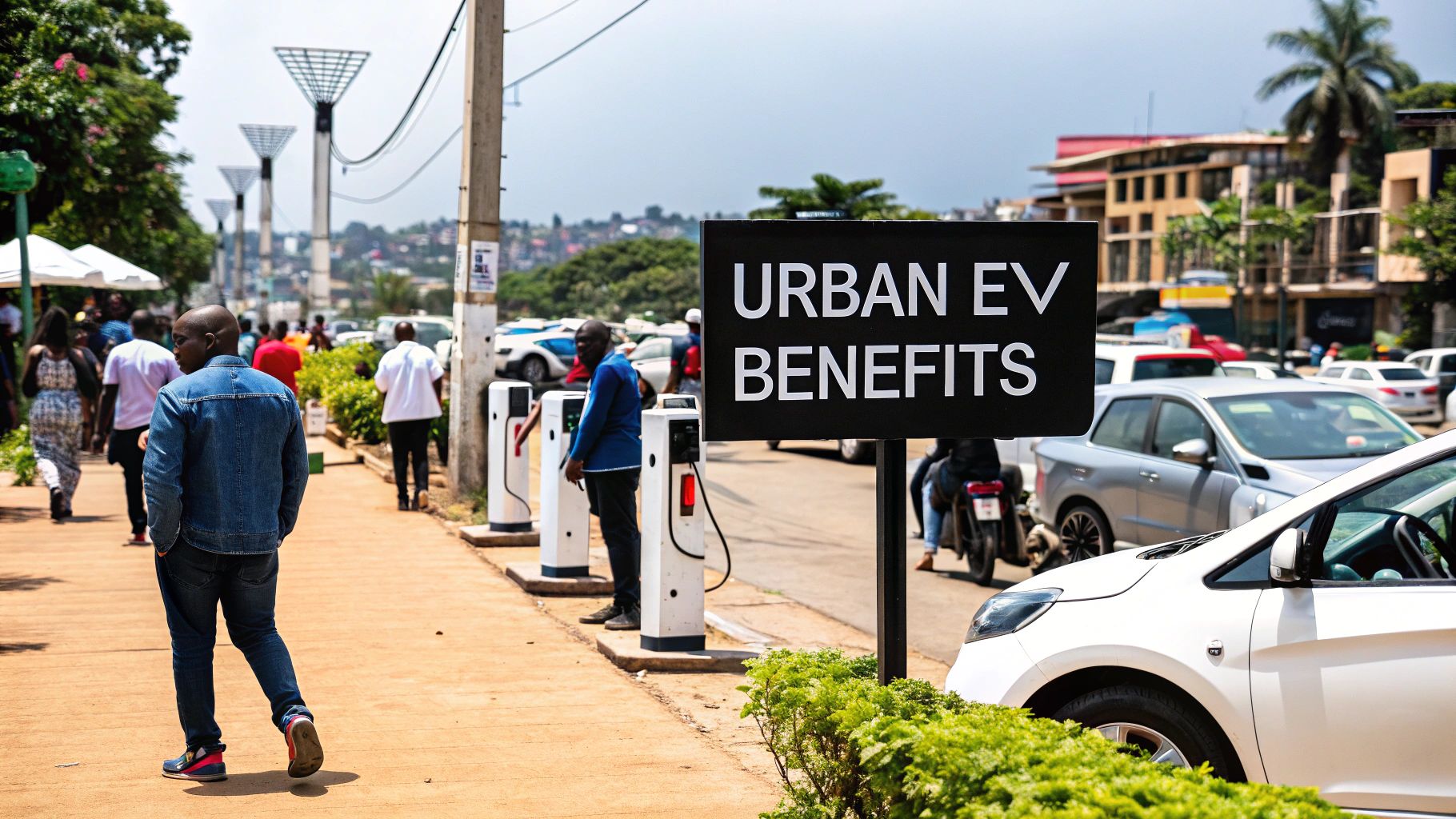
This isn't just about selling cars. It's a full-blown ecosystem of electric solutions. You’ll find everything from the four-wheeled vehicles we all know to the affordable electric motorcycles—the "e-bodas"—that keep our cities moving. Add in the versatile three-wheelers handling deliveries and taxi services, and you have a hub designed for practical, everyday life.
More Than Just Vehicles
The real magic of an African EV marketplace is that it’s a complete support system, not just a point of sale. It cleverly bundles the vehicle with all the essential services needed to make it a smart, workable alternative to petrol. This approach is what’s turning the dream of going electric into a day-to-day reality for millions.
This integrated model directly tackles the biggest hurdles holding back EV adoption. Think about it. Instead of just selling someone a motorcycle and wishing them luck, the marketplace connects the rider to a network of battery-swapping stations. Just like that, range anxiety disappears. This is absolutely critical in a region where reliable public charging points are still a work in progress.
An African EV marketplace functions as an entire ecosystem, not just a storefront. It bundles vehicles, financing, charging, and after-sales support into a single, accessible package, making the transition to electric mobility seamless and logical.
This ecosystem model is already showing incredible results in countries at the forefront of the shift. In Rwanda, for example, the vehicle market is changing fast. Out of the country's 275,000 to 300,000 registered vehicles, the EV sector is growing rapidly, especially electric motorcycles and hybrid cars. If you want a deeper look at this evolution, you can explore more on the Rwandan mobility landscape at MobilityX.africa.
Core Components of the Ecosystem
So, what are the moving parts that make this model tick? Each component is carefully designed to solve a specific local problem, whether it's the initial cost or the lack of grid infrastructure. A successful marketplace usually brings together:
- Diverse Vehicle Options: The focus is on affordable two- and three-wheelers that people actually use for their daily commute or small business, alongside a smart selection of electric cars and buses.
- Flexible Financing: This is key. Options like "pay-as-you-go" models, micro-loans, and lease-to-own schemes make the upfront cost of an EV affordable for people on a regular income.
- Innovative Energy Solutions: Here’s where it gets really smart. We’re talking about battery-swapping stations for motorcycles and even solar-powered charging hubs that don't have to rely on a shaky power grid.
- After-Sales Support: A vehicle is only as good as its maintenance. These marketplaces provide access to trained technicians, spare parts, and local service centres to keep everything running smoothly.
What this all means is that a customer isn't just buying a product; they're buying into a complete mobility solution. Platforms like EV24.africa take this a step further by acting as a central hub where you can browse vehicles, get your head around import processes, and connect with all the resources you need. It simplifies the entire journey of getting an EV in Africa, making it transparent and straightforward from start to finish.
How Pioneering Nations Are Leading the Charge
The idea of a thriving EV marketplace in Africa isn't just a concept on a whiteboard anymore—it's being built, right now, by forward-thinking nations. These trailblazers are creating a blueprint for the rest of the continent, proving that with a clear vision and bold policies, you can make huge strides in a short time. They show just how powerful government support can be in creating fertile ground for innovation and investment.
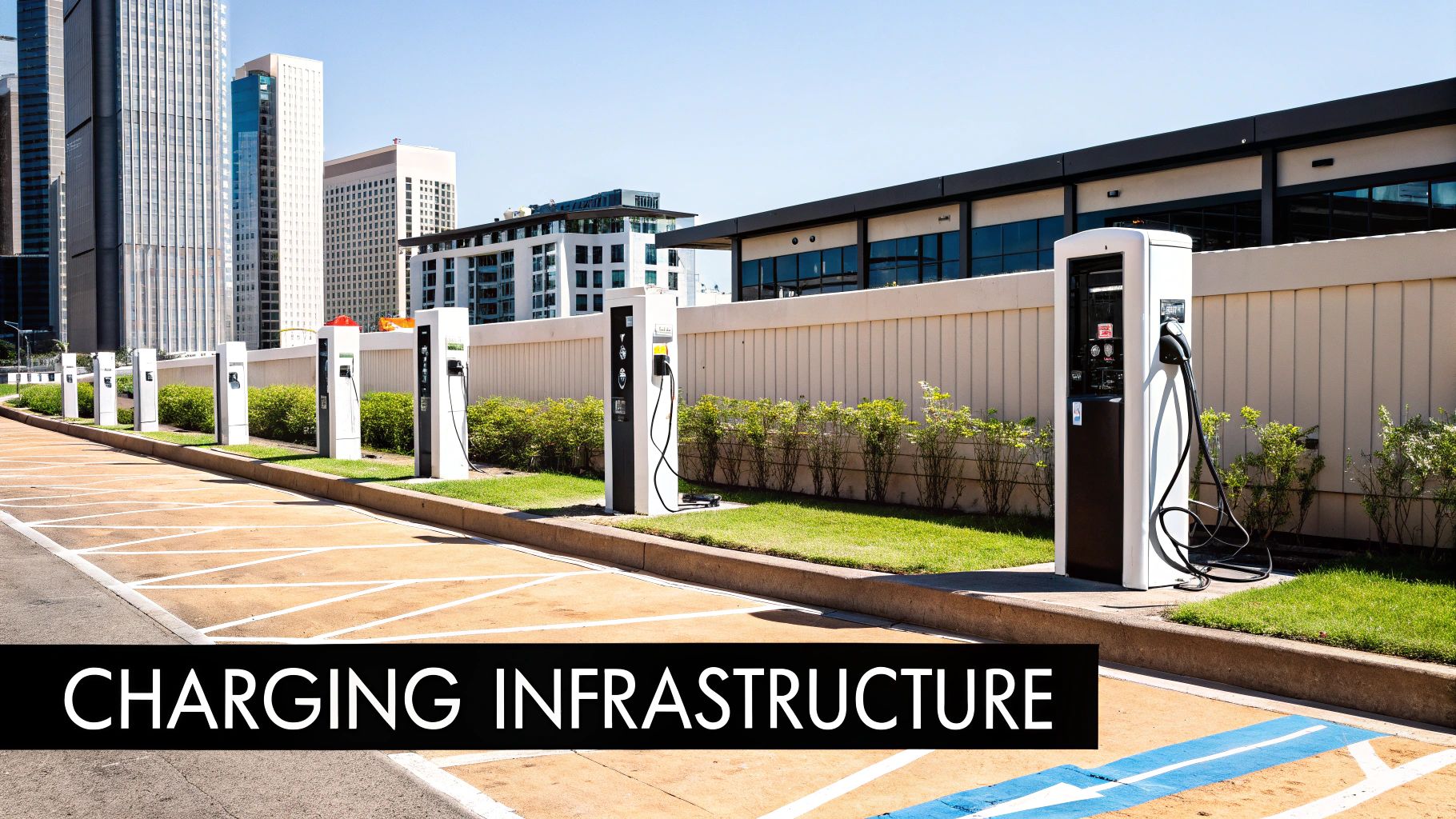
Among these leaders, Rwanda is a fantastic case study in deliberate, effective action. The country has embraced e-mobility not just as an environmental goal, but as a core part of its economic development strategy. By taking decisive steps, Rwanda has made itself an incredibly welcoming place for electric vehicles.
This proactive approach has delivered real, measurable results. The number of electric vehicles on Rwandan roads jumped from a mere 19 in 2020 to 515 by 2024. This growth was put into overdrive when the government mandated that all public transport motorbikes must be electric from January 2025—a global first.
The Rwandan Playbook for Success
Rwanda’s strategy is a masterclass in kickstarting an EV market. It’s not just one single policy; it’s a whole ecosystem of interconnected incentives designed to make going electric the most logical choice for everyone, from individual riders to big businesses.
These policies work in harmony to lower costs, build public confidence, and signal a serious, long-term commitment to a green transport future.
Here’s a look at what they’ve done so well:
- Tax Exemptions: Rwanda completely scrapped import duties on electric vehicles, batteries, and charging equipment. This move directly tackles the high upfront cost, making EVs instantly more competitive against their petrol counterparts.
- Reduced Electricity Tariffs: They introduced special, lower electricity rates at charging stations. This directly cuts running costs for EV owners and makes the financial benefit of switching impossible to ignore.
- Free Land for Charging: The government offered rent-free land for private companies to build and run charging stations, which removed one of the biggest hurdles to building out infrastructure.
- Bold Public Transport Mandates: As mentioned, forcing the entire public motorcycle taxi fleet to go electric sends a powerful message to the market. It guarantees demand and gives investors the confidence to jump in.
This comprehensive strategy shows a deep understanding of the challenges, and it offers practical, targeted solutions for each one.
Rwanda's success comes from a simple but powerful idea: make the switch to electric the easiest and most financially sensible decision. By knocking down financial barriers and building a supportive infrastructure, the government has become an accelerator of change, not just a regulator.
Other Emerging Leaders on the Continent
While Rwanda provides an excellent model, it is far from alone. Across the continent, other nations are developing their own unique strategies, contributing to a diverse and dynamic e-mobility movement. This continent-wide momentum is quickly turning Africa into a significant player in the global conversation.
Kenya is another key player, especially in the two-wheeler and public transport sectors. The country already gets a high percentage of its power from renewable sources, making EVs a genuinely clean alternative. The government's draft National E-mobility Policy is focused on setting up local assembly plants and expanding charging infrastructure, positioning Kenya as a regional hub for the EV marketplace in Africa. You can learn more by exploring our detailed look at East Africa’s EV trajectory, which covers the distinct progress in Rwanda, Kenya, and Uganda.
Meanwhile, South Africa has the most developed automotive industry on the continent and is slowly pivoting towards EV production. With established manufacturing muscle and a growing consumer market, the country has the potential to become a major producer of EVs for both local use and export.
These pioneering nations are proving that Africa isn't just following a global trend—it's actively shaping its own electric future. Every success story provides valuable lessons, creating a ripple effect that inspires and guides neighbouring countries on their own journey towards cleaner, more sustainable transport.
Turning Roadblocks into Opportunities for Innovation
The road to an all-electric Africa has its share of bumps. While the potential is massive, we have to be realistic about the obstacles on the ground. But here’s what makes the African e-mobility story so interesting: these challenges aren't stopping progress. Instead, they're sparking incredible home-grown innovation.
Entrepreneurs and engineers across the continent see these problems not as dead ends, but as invitations to build solutions that actually work for local communities. Three main hurdles keep coming up: the high upfront cost of EVs, the lack of public charging points, and unreliable power grids. Each one demands a uniquely African answer.
The High Cost Hurdle
For most people thinking about switching to electric, the first barrier is the price tag. Electric cars, especially, often cost more upfront than their petrol or diesel counterparts. That's a big deal in markets where every shilling, naira, or rand counts.
So, what's the solution? A key strategy that's really picking up steam is local assembly. Instead of importing a finished car, companies bring in the parts and put them together in-country. This clever move slashes import duties and shipping costs, which directly lowers the final price for the buyer. It's a win-win, really, because it also creates skilled local jobs and gives the economy a welcome boost.
The image below gives you a snapshot of how different countries are tackling EV adoption, comparing things like charging infrastructure and government incentives.
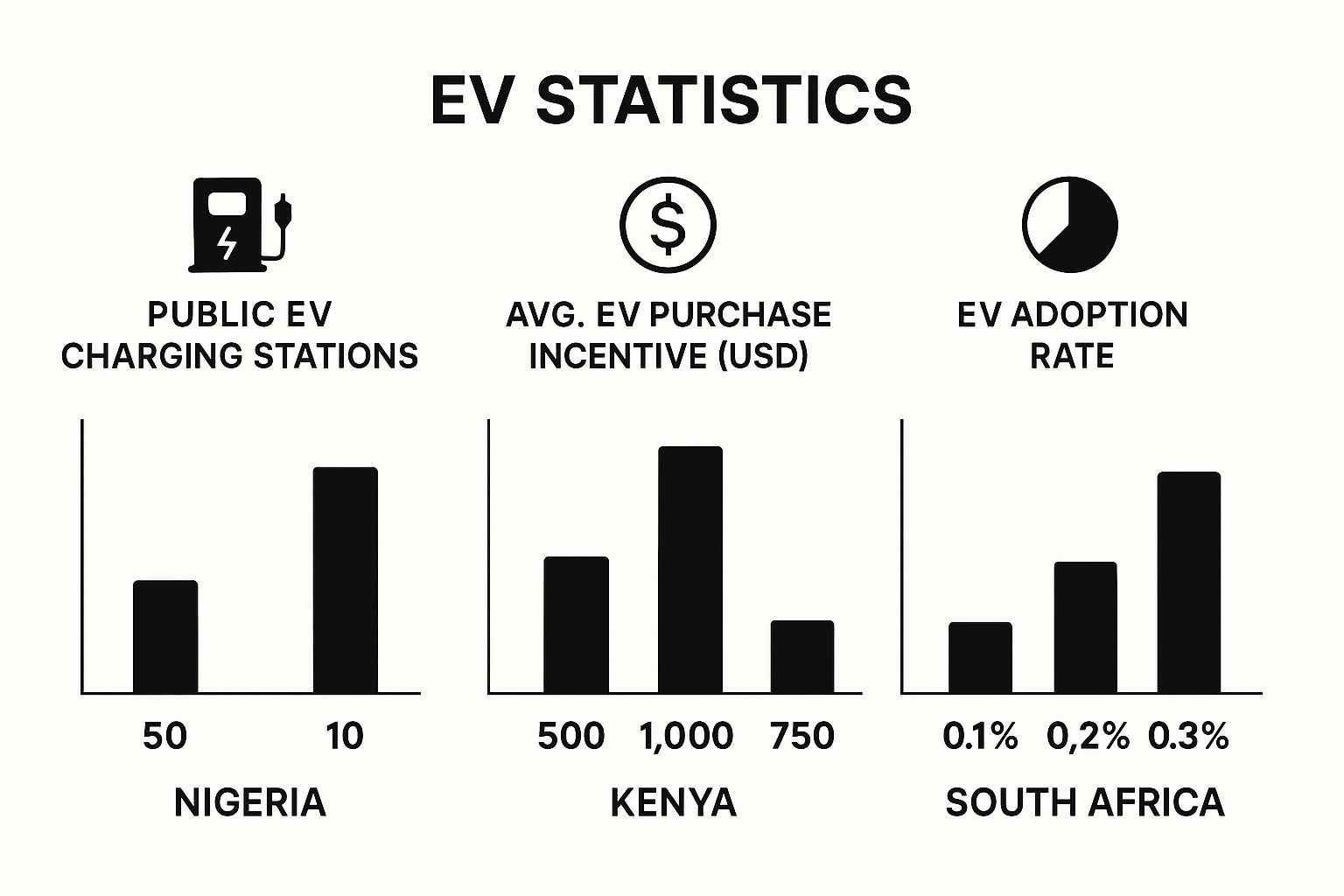
As you can see, there's no single approach; the strategy changes from one region to another. If you want to dive deeper into how these trends are shaping up elsewhere, our analysis of North Africa’s EV market outlook provides some great insights.
Overcoming Infrastructure Gaps
The next big challenge is the shortage of public charging stations. In Europe or North America, EV drivers can usually count on finding a charger nearby. But in many parts of Africa, that network is just getting started. This leads to what we call "range anxiety"—the constant worry that you'll run out of power miles from a plug.
This is where African ingenuity really comes to life. Rather than waiting for a massive, Western-style charging grid to appear, local start-ups have developed battery-swapping-as-a-service.
It's a brilliantly simple idea. A rider on an electric motorcycle (or e-boda) doesn't own the battery. When it runs low, they just ride into a swapping station, hand over the depleted battery, and get a fully charged one in less than two minutes. It’s even faster than filling up at a petrol station.
To get electric mobility right, a solid electric vehicle charging infrastructure is non-negotiable. This means finding the right mix of solutions for both bustling cities and remote rural areas.
The table below breaks down some of these unique challenges and the clever, locally-driven solutions that are emerging to solve them.
Challenges and African-Led Solutions in the EV Marketplace
| Challenge | Conventional Approach | Emerging African Solution |
|---|---|---|
| High Vehicle Costs | Rely on manufacturer subsidies and government tax credits. | Focus on local assembly to reduce import duties and create jobs; promote more affordable electric two- and three-wheelers. |
| Limited Charging Grid | Build a dense, grid-dependent network of public fast chargers. | Pioneer battery-swapping stations for commercial fleets (like e-bodas), offering instant "refuelling." |
| Grid Instability | Hope the national grid can handle the extra load from EV charging. | Develop solar-powered charging hubs with integrated battery storage, creating off-grid, reliable energy sources. |
These solutions show a shift from simply copying what works elsewhere to creating systems designed from the ground up for the African context.
Building Resilience Against Grid Instability
Finally, even when you can find a charging point, it’s only useful if the power is on. Unreliable national grids in some regions can make owning an EV a gamble. The smartest solution? Don't rely on the grid at all.
Many new charging stations are being built with their own solar panels and battery storage. These off-grid (or grid-assisted) hubs provide a steady stream of clean energy, ensuring EVs can charge up day or night, whether the main grid is working or not. It turns a major weakness into a source of strength, creating a resilient, decentralised energy system for transport.
By tackling these obstacles head-on, the African EV market is carving out a path that is not just innovative, but entirely its own.
The Real-World Impact of Going Electric in Africa
When we talk about electric vehicles in Africa, it’s easy to get lost in the technology. But the real story is about something far more fundamental: a powerful shift that’s reshaping economies and improving lives, right now. This isn't some far-off dream; the benefits are tangible, starting with the individual driver and rippling out to strengthen entire nations.
Think about the bigger picture for a moment. Many African countries spend a fortune on imported fossil fuels, a constant drain on precious foreign currency reserves. By embracing e-mobility, nations can drastically cut that import bill. That's money that can be funnelled back into what truly matters—healthcare, education, and building better infrastructure.
It’s a strategic move towards greater economic self-reliance and long-term stability.
National Economic Transformation
At the national level, the move to electric vehicles is nothing short of a game-changer. Take Rwanda, for example. Their push for EVs isn't just about clean air; it's a calculated strategy to slash oil dependency. The country is projected to save an estimated $22 million a year on fuel imports, a direct boost to the national budget. This bold step positions Rwanda as a leader in Africa's green transition, sparking local manufacturing and creating new jobs in EV assembly. It’s a powerful blueprint for others to follow. You can dig deeper into these economic projections for the African EV market on Marketdataforecast.com.
This economic pivot creates a virtuous cycle. The less a country spends on foreign oil, the more it can invest in building its own EV ecosystem. This translates directly into:
- Job Creation: New roles are popping up everywhere—from vehicle assembly and battery tech to charging station maintenance and software development.
- Local Industry Growth: A thriving domestic EV market needs local suppliers for parts and services, which strengthens the entire industrial base.
- Energy Security: Shifting to locally generated electricity, especially from the continent's vast renewable resources, insulates the transport sector from volatile global oil prices.
The Financial Wins for Individuals and Businesses
The advantages are just as compelling on a personal level, especially for anyone whose livelihood depends on their vehicle. Just think of the countless boda boda (motorcycle taxi) riders who are the heartbeat of so many African cities. For most of them, fuel is the single biggest hole in their pocket each day.
Making the switch to an electric motorcycle completely changes the maths. Electricity is dramatically cheaper than petrol, and with fewer moving parts, the constant need for oil changes and engine tune-ups simply disappears. Those daily savings pile up fast, putting more money directly into the hands of riders and helping them build a more secure future for their families. To get more context, our article on EV market trends and growth drivers in Africa offers some great insights.
For a commercial driver, switching from petrol to electric isn't just a minor upgrade—it's a fundamental change to their business model. The daily operational savings can be the difference between just getting by and building a prosperous future.
This same logic applies to businesses running delivery fleets or taxi services. Slashing fuel and maintenance costs means healthier profit margins and a real competitive advantage. An EV marketplace in Africa helps make this happen, connecting businesses with the right vehicles and the support they need to make a smooth transition.
A Healthier Environment for All
Beyond the powerful economic case, the environmental benefits are impossible to ignore. Air pollution is a serious health crisis in many of Africa’s urban centres, causing respiratory diseases and other chronic health issues. Petrol and diesel engines are one of the main culprits.
Every single electric vehicle that replaces a combustion engine is a win for public health. It means an immediate reduction in tailpipe emissions, leading to cleaner, more breathable air in our cities.
What’s more, electrifying transport is one of the most effective tools African nations have to meet their climate commitments. It cuts greenhouse gas emissions at the source. And when those EVs are charged using the continent's incredible renewable energy potential—from solar to hydro—the positive impact is amplified, paving the way for a truly sustainable and self-sufficient future.
Finding Your Place in Africa's Electric Future
The move towards electric vehicles across Africa isn't just a tech trend; it's a massive opportunity unfolding right now. We've already seen how the right policies and local innovation are shaping a uniquely African approach to sustainable transport. The continent isn’t just following; it’s leading the way.
Now, the big question is: where do you fit into this picture?
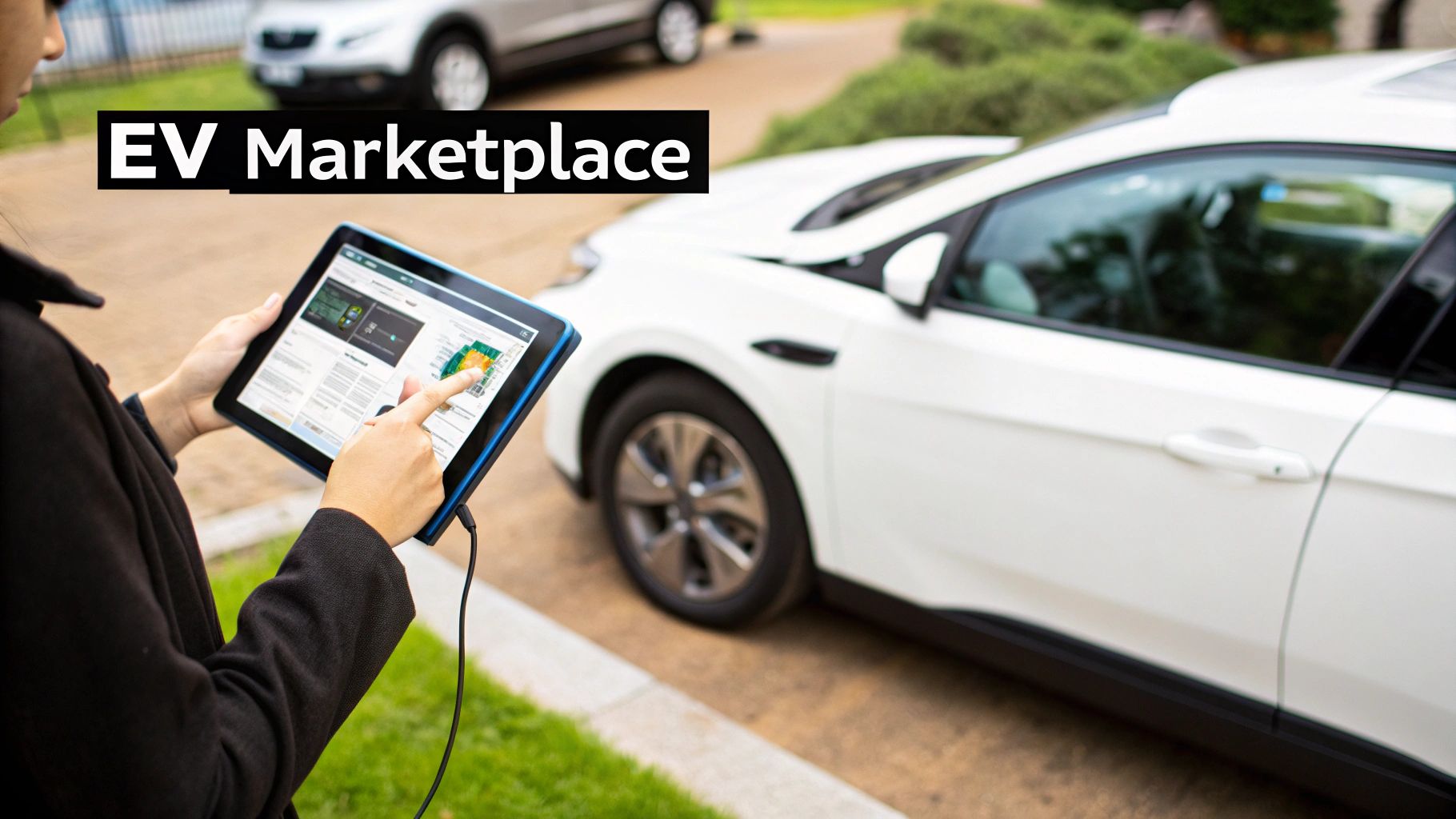
Whether you're thinking of buying your first EV, starting a new business, or looking for the next big investment, there's a space for you. The road ahead is being built by people who see the potential and are ready to jump in.
Opportunities For Everyone
The growth of the EV marketplace in Africa isn't a one-size-fits-all story. It opens up different doors for different people, each with the chance to make a real impact—both for their wallets and for the environment. Figuring out where you stand is the first step.
-
For Buyers: Making the switch to electric is a smart long-term move. You're not just helping to clean up the air; you're also saving a significant amount of money on fuel and maintenance day after day. Platforms like EV24.africa are designed to make this jump easier, helping you find the perfect EV without the usual hassle.
-
For Entrepreneurs: The field is wide open. Think beyond just selling cars and look at the services everyone will need. There are huge gaps in the market for solar-powered charging points, smart battery software, and dedicated EV repair shops. For businesses running vehicle fleets, a comprehensive guide to electric vehicle fleet management can provide some crucial insights on making a smooth transition.
-
For Investors: The e-mobility sector in Africa is on a steep upward curve. Getting in early on infrastructure projects, local assembly plants, or financing services for EV buyers could deliver serious returns as the market expands.
The message is clear: Africa's electric future isn't a spectator sport. It needs everyday people choosing cleaner transport, innovators building the support systems, and investors providing the fuel for growth.
Pioneering governments and bold entrepreneurs have laid the groundwork. What happens next depends on all of us. The future of African transport is electric, and there has never been a better time to get on board.
Frequently Asked Questions
Thinking about making the switch to electric in Africa? You're not alone, and it's natural to have a few questions. We've gathered some of the most common ones we hear from buyers, business owners, and investors to give you the straightforward answers you need.
Are Electric Vehicles Actually Affordable for the Average Person in Africa?
It’s a fair question. While the upfront cost of an electric car can look steep, the real story is in the clever ways the market is adapting. The biggest focus right now is on electric motorcycles and scooters.
These e-bikes are often priced to go head-to-head with their petrol-guzzling cousins, putting clean transport within reach for millions. On top of that, many governments are offering tax breaks, incentives, and new financing options to bring down the initial cost for both bikes and cars, making the leap to electric more manageable than ever.
What Happens If My Battery Dies Far from a Charging Point?
That feeling, often called 'range anxiety', is a huge concern, but Africa is tackling it with some brilliant, locally-minded solutions. For the booming e-motorcycle market, battery-swapping stations are the game-changer.
Instead of waiting for a recharge, a rider just pulls in, swaps the empty battery for a full one, and is back on the road in minutes—often faster than a petrol fill-up. For cars, the charging network in major cities is growing steadily, and many new stations are solar-powered, so they keep working even when the grid doesn't.
Africa's answer to range anxiety isn't just about building more chargers; it's about rethinking the entire refuelling process. Battery swapping offers a faster, more convenient solution that perfectly fits the high-use commercial motorcycle sector.
Is Now a Good Time to Invest in Africa's EV Market?
Absolutely. The market is standing at the edge of a massive growth spurt, making this a pivotal moment for investors. Projections show a dramatic expansion over the next few years.
Getting in early on key sectors could lead to significant returns. The most promising areas include:
- Charging infrastructure projects
- Local vehicle and battery assembly plants
- Software and fleet management technology
- Digital marketplace platforms like EV24.africa
With strong government support in key countries and a massive, tech-savvy population, the long-term forecast for the EV market here is incredibly bright. It’s easily one of the most exciting growth opportunities on the continent.
What Kinds of EVs Are Most Popular in Africa?
Right now, it's all about two and three wheels. Electric motorcycles (e-bodas) and three-wheelers are absolutely leading the charge, and for good reason.
They're cheaper to buy, cost far less to run each day, and are perfectly built for zipping through congested city streets for deliveries or personal travel. While the electric car scene is growing, these smaller, nimbler vehicles are the first taste of electric mobility for most people across Africa.
Ready to see what's out there? At EV24.africa, we make finding, buying, and importing your next electric vehicle simple and clear. We offer a huge selection and support you every step of the way. Find your perfect EV today at https://ev24.africa.




